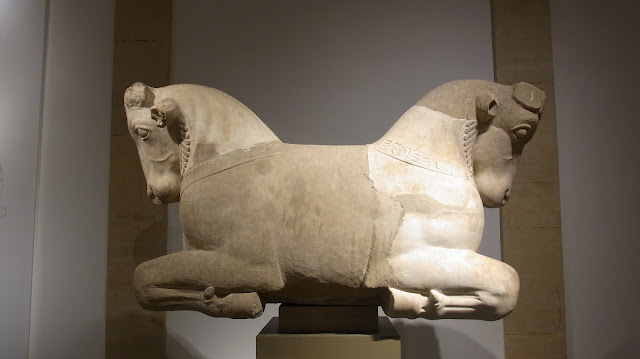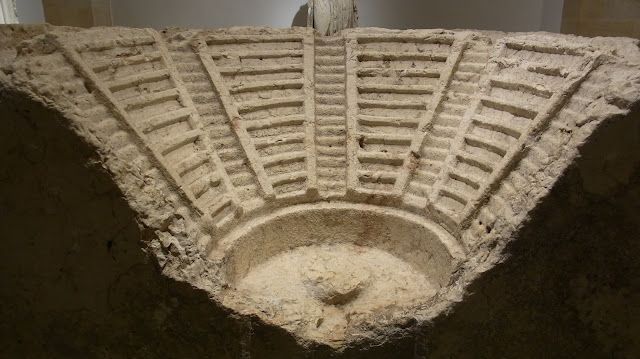 |
| A Syrian girl tries to help her family in the east-side neighborhood of Mar Mikhael. |
1. Taxi drivers will honk at you. I'm talking about when you're walking on the sidewalk. They'll toot their horns as if to say, "Only idiots walk; what do you think I'm here for?" In truth, it's hard to have fun in Beirut until you figure out the taxis. Yes, there is a system of minibuses, but the cabs are faster and almost as cheap. The first thing you do is stick your head through the window and announce your destination. If the driver holds up two fingers, it means he wants 6,000 pounds ($4). This is the price to get virtually anywhere in the city short of the airport. After awhile I started acting more Lebanese, pretending $4 was too much. "One service," I'd say, hoping for a $2 ride. Sometimes it works, other times they drive off. I will say this: I have never been ripped off by a cabbie here, or shortchanged at a cash register for that matter.
2. Lebanese hate to walk. Sensing a theme? At lunchtime, everybody in Beirut dials up a delivery service, even if their falafel guy is two blocks away. Had a beer with a guy who says his co-workers think he is insane for walking 20 minutes to work.
 |
| Storm clouds: Hard to see anything good on the horizon without more grassroots activism. |
4. Everywhere you go in the world, people insist the tap water is unfit to drink. Even in my hometown you see folks paying good money at these 5-gallon water dispensers. They're crazy; we all know it. But Beirut is the only place I've ever been where not even the chamber of commerce will vouch for the city's water. Some say it's mixed with seawater dashed with a soupcon of E. coli. I've been bathing and brushing my teeth with it but drinking only bottled water out of an abundance of caution.
 |
| Job security: cafe delivery boys in a city where walking is ridiculed. |
5. How many people are employed here as private security guards or parking valets? I swear if these people were thrown out of work and all the cellphone-accessory stores closed, the Lebanese economy would collapse.
6. Lebanese hipster: impossibly lustrous black beard (jealous) + over-the-shoulder railroad porter bag + man-bun. There. You're set to go out.
7. The garbage situation is what it is. The violent You Stink protests of late 2015 are over and trash is no longer piled up on Beirut's streets. Can I smell the dump in Bourj Hammoud? Nine days out of 10, no. When the wind is just right you get a French cheese odor, which isn't so bad if you think of it that way. There's also a slaughterhouse there, so you never know exactly what you're smelling. Lebanon hasn't had a president for 2 years and parliamentary elections for 7 years. So the government doesn't work. Like, literally, I don't think the elected officials go to work.
8. It's not a city for the jumpy. If you're not willing to walk in front of a moving vehicle, you'll never get anywhere. And it's a crowded place: Disagreements break out here and there and the fireworks are a plague. Every day that I left my apartment building I had a strong feeling that things would work out for the best. Every night when I returned, I told myself, "God, that was fun!"
9. The currency is pegged to the U.S. dollar and dollars are accepted just about everywhere. If you pay with dollars, however, you'll get Lebanese pounds (or lira) in return. Ideally, the visitor to Beirut will want a pocketful of U.S. fives and Lebanese one thousands and five thousands. Merchants are really picky about American bills. They run their hands over them like Helen Keller, and if they're a bit creased they'll ask for another one.
10. Your bicycling prospects are good. Drivers are generally alert and undistracted. Streets are narrow, made more so by mercenary and unregulated parking. Hard-charging perpendicular traffic and dooring pose the biggest threats. Don't expect calming on Friday; it's a regular workday. The morning flow doesn't get into the full swing until around 7:30, and even then congestion is your friend. At midday I honestly think you can cross the city east to west faster on a bike than in a cab. North to south, not so much because of the hills.
 |
| Somebody's investing in the jungle. Martyrs' Square (a dirt lot) is in the foreground. |
11. Three languages are in play here. I hear more Levantine Arabic than anything else, but I’ve seldom felt the need to use it except to make small talk with older folks on the west side. The Armenians use it to talk to one another. You hear a lot more French on the east side, but it’s funny — it sounds like a French spoken by people who are learning to speak French. Bahn-jerr, etc. I never ventured into the vast Dahiya suburbs on the south side, but in the rest of the city, every encounter begins with bonjour, and then you figure it out from there. I must have “English speaker” tattooed on my forehead because I get “Hello dear” and “Nice weather we’re having” from complete strangers.
12. It's a charming Mediterranean port, if you squint. In an act of great humanity, Lebanon, a country of 4 million, has taken in 1 million Syrian refugees, rendering trivial the political debate in the U.S. about accepting 10,000 over the next year. This country doesn't lack generosity; it lacks concentration.
 |
| Workers building a more upscale Beirut — but for whom? |
In its capital, the luxury hotel and condo inventory seems grotesquely overrepresented. Manual laborers carry shouldersful of concrete blocks from streetside vans into high-rises under construction. When the sun begins to fall they are trucked home down Armenia Street, lined with bars and restaurants they could scarcely afford to visit. Life at the bottom of the Lebanese totem pole, as everywhere, is a rough go, but the wealth gap here may be more pronounced than anywhere I've visited.
Many if not most of my neighbors, even people of very modest means, have an Ethiopian or South Asian maid. These housecleaners and child minders are easy to spot because they actually wear gray, pink or blue cotton uniforms with white collars and pocket hems. When you read in the newspapers, as you occasionally do, of a domestic helper throwing herself off her employer's balcony, only the imagination can supply the particular indignities that led to that moment.
Many if not most of my neighbors, even people of very modest means, have an Ethiopian or South Asian maid. These housecleaners and child minders are easy to spot because they actually wear gray, pink or blue cotton uniforms with white collars and pocket hems. When you read in the newspapers, as you occasionally do, of a domestic helper throwing herself off her employer's balcony, only the imagination can supply the particular indignities that led to that moment.

Lebanon boasts about its vibrant civil society, and the people here have experienced stuff no one should have to go through. But at some point its residents, who have perfected the art of complaining — about traffic, food safety, environmental degradation, the mismanagement of its water and power resources — have to take control of their future. A little less carpe diem, a little more collective responsibility. One had hoped the garbage crisis could have been that catalyst, but now that the streets are relatively clean, the electorate seems to have reverted into a shared coma. Apologies for the uninformed blather. I like these people and I worry about 'em.
 |
| "Stop Soldiere." This highly visible statement against the politically connected company in charge of redeveloping Beirut's antiseptic city center would be unthinkable in any other Arab country. |
One Saturday morning around 3 a.m., somebody in the neighborhood cranked up some of the loudest music I’ve ever heard. It started with a woman’s wail, joined by drums and swirling synths. Her voice soared and trilled against this muscular Oriental percussion. Not a melody by any means, more of a sonic labyrinth — a meandering piece of glassy electronica made all the more surreal by being woken by it. It was incredibly cool and I didn’t want it to end. But when the song was over, silence returned to the neighborhood. A couple of dogs barked and everybody went back to bed.
That pretty much sums up my brief visit to Beirut. I’m not sure what I’ve just experienced but I don’t want it to end.
The city's charms reveal themselves simply, face to face. I love how Arabic speakers greet one another. “Morning the light,” they’ll say. The response is “Morning the good.” I cannot begin to count the gifts these folks have given me — the genuine warmth and friendship they’ve shown. They seem tickled by my confusion and practically run to my assistance, as if I’m some sort of teenage backpacker. Many make a point of saying hello to me every day.
All is not good and light, of course. The scars of war are everywhere, Bad actors are probing inside Beirut and it’s a weak country in a neighborhood of bullies. But wherever you travel, from Beirut to Brussels to Bakersfield, please don’t forget that the most dangerous part of any journey is the cab ride from the airport. See you in the fall.
Fin











































